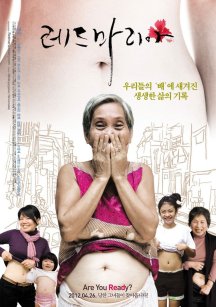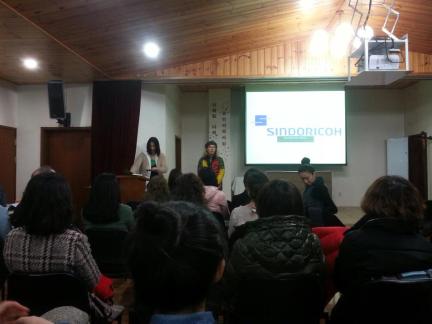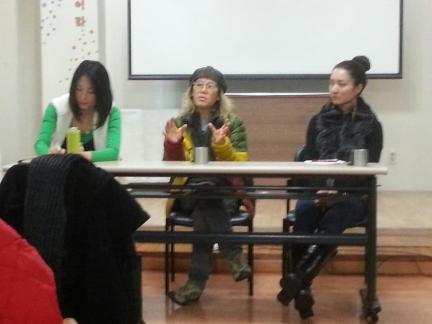Red Maria (레드 마리아) screening and Q&A with Director Kyung Soon (경순)
 The Women’s Global Solidarity Network hosted a special event on Saturday the 8th of December at the Columban Mission Center in Seoul – a screening of documentary Red Maria (레드 마리아), as well as a Q&A session with director Kyung Soon (경순).
The Women’s Global Solidarity Network hosted a special event on Saturday the 8th of December at the Columban Mission Center in Seoul – a screening of documentary Red Maria (레드 마리아), as well as a Q&A session with director Kyung Soon (경순).
Red Maria (레드 마리아), for the uninitiated, is a documentary addressing the plight of ‘labor’ amongst a selection of women in Korea, Japan, and The Philippines. Director Kyung Soon highlights how while the women in each respective country lead quite radically different lives, they are all subject to the same restrictions imposed upon them by patriarchy. Within The Philippines, women who are involved in the sex trade, families living in the slums, and elderly women who came forward about the atrocities committed by Japanese soldiers, are interviewed. In Japan, homeless women, care-workers, and those unjustly fired are profiled. Within Korea, female protestors, immigrant wives, and sex workers lives are conveyed. Throughout the broad selection of female lives that are documented, director Kyung Soon establishes not only the incredibly difficult situations forced upon them by patriarchal culture, but also – and perhaps more importantly – how the women find the strength and courage to fight their battles and improve their lives.
Before the film began, the director told the audience she wanted to explore the idea of women’s labor and the labels ascribed to them, and asked those in attendance to consider these areas when watching. Interestingly, she also stated that Red Maria (레드 마리아) is not a typically ‘kind’ film in reference to the themes explored within and also the critiques of patriarchal culture.
The documentary was well received by the audience, and director Kyung Soon graciously answered questions from the audience following the screening. Her answers were very kindly translated by members of the Women’s Global Solidarity Network.
Question: Thank you for making such a moving film. What is the significance of the belly (a recurring motif within Red Maria)? Why not the hand, or something?
Director Kyung Soon: When I was young, I was actually very interested in bellies. In Korea, we have the public bath house culture, so when I was young there were not many separate shower rooms. We had a special day for going to the bath house, and when I went there I could see all the ranges of women in terms of age. From grandmothers to really young women, I could see them all naked. When I saw my grandmother’s and mother’s belly and body it was really fun for me to touch them because they were so soft and funny feeling. As I grow older, whenever I go to the public bath house and see young women’s bellies, I feel very sad. When I was young bellies to me meant a warm place, but nowadays it’s like a shameful part of the body. So now you see in modern Korea, in terms of dieting, women are trying to get rid of their bellies. Even though it’s a part of their body, they actually try hard to get rid of it. So when I see that kind of culture, I feel very angry about it. I still enjoy going to the bath house, but now when I see women’s bellies I feel angry about them. In my opinion, the reason why a woman is a woman is because of her belly, and how a man becomes a man is because of the penis. But men don’t do anything else with their bellies, relatively speaking, compared to a woman. Actually I think a woman’s labor starts with their belly as it is connected to the uterus and vagina. For example when we have a period this is something we need to do, and also it’s a special thing to do, but actually no-one cares or talks about this as labor. Then having sex, and delivery babies and having abortions, these are all connected to the belly and women’s labor. But with this kind of labor women can’t get any benefits in terms of money. So of course people labor with their hands, but I think fundamentally we need to look at our bellies and what bellies actually mean for our lives and how they define labor.
Question: What was your reason for choosing those three countries in particular? What did you see as the underlying connection between Korea, Japan and The Philippines?
Director Kyung Soon: Before I made Red Maria my previous work was Shocking Family (쇼킹 패밀리). It was about criticizing the concept of the Korean family. So through this film I showed the women’s role within the family, within the patriarchal culture in Korea. And for that film I was invited to Japan a lot. Before that I didn’t have many chances to go to Japan, but because of this movie I was invited 7 or 6 times and through these kinds of events I met a lot of Japanese women. As I met a lot of Japanese women I was quite shocked to find the reality they faced in their own country. In Korea when we talk about the low birth rate, the Korean media always describes Japan as a very successful country that got over the low birth rate. But what I found out was that these Japanese women had the same problems that Korean women face. Also in Japan, even though it is a very wealthy country there is a really strong social order in Japan and that kind of culture makes women feel very suffocated. So when Japanese women go on strike or struggle in their work places or with their family they don’t have the spaces to make or build solidarity with other people. So when you see my film you can see Sato, the Japanese woman who was working hard, struggling and on strike by herself. What I actually saw in Japan was that they need some communication channels among people – among women – who are struggling. What I felt as I met these women, whether they live in wealthy countries or poor countries their problems are very similar and they share a lot of common things in terms of their struggles. Maybe there are some differences, for example if you are living in a wealthy country you might wear more expensive clothing, or eating better food, but still I think the fundamental problems women share are very common. And the reason I chose the three countries are that you can see the poor countries and the wealthy countries at the same time based on the women’s labors. We can see their problems within the specific country’s cultural context, so that’s why I chose these three countries. And I also think women’s lives have not been dramatically changed except for the invention of the electronic cooker and washing machine. The reason that I chose The Philippines was because although there are a lot of migrant women who came to live in Korea, I actually found many of them were Filipino. So I didn’t really know much about The Philippines. But in 2007 I went to The Philippine and lived there for a year, and to learn their culture and study. From 2008 I started filming this film. And also when you are watching you can see these three countries share a similar history, for example how Korea was colonized and The Philippines was effected by the imperialism, and you can see the female victims of the war.
Question: First I’d like to thank you for the film, I really enjoyed it. One of things I found interesting was how it is difficult to gain self-realization through work. As a female laborer, I thought you showed the difficulties well how difficult it is to gain self-realization through labor. Because the work we can do, the work we want to do, is very limited. But at the same time, it might actually be a common problem for all the people who work in this world. So in that context, what do you think about this kind of problem?
Director Kyung Soon: As capitalism grows bigger and bigger, and the internet becomes really accessible don’t we share a lot of information together? But I think it’s very much marginalizing the actual problem. You can see all the incidents, events and access all the information easily. There are so many things of interest. Is this something you need to seriously consider or think about? For example, what does ‘liberal’ mean? What does the term mean to us? We rarely think about labor. When we look for the definition of ‘labor’ in the dictionary it is defined based on payment without really considering what labor really means. So when you think about labor in this way, you can look back and think about the labor that you were doing that didn’t involve getting paid. Then in this context, or this definition, we can’t enlarge the meaning of labor. So if labor is only based on payment, or the amount of payment, then if you earn a lot of money you might think that you reached the top of self-realization earlier than other people. But if you earn five grand a month or a grand a month, people still face the same difficulties. Because the person who earns five grand tries to pay off their mortgage debt, but the person who earns a grand a month have to pay their monthly bill for their house. So I actually think everyone is getting poorer in this society. I think we can’t just divide people like this. I think we are all connected. What I want to say is that self-realization can’t be measured based on the payment you receive from work. I think the answer that I want to show through the film is that we should make the world for the people who only earn a grand but that they are still able to gain their self-realization. The way each person lives seems very challenging within society but I think it’s a very fundamental question you need to ask yourselves. One thing that I want to add here is that in Korea we have a proverb that unemployed people can die due to overworking and stress, which means that even though they are unemployed they still have a lot of things to do. Which shows that being unemployed is only based on capitalism. So you don’t get any money, but you still do a lot of things. For example, people can volunteer. They don’t get paid to do that, but actually through volunteering they can gain self-realization. Therefore if we only look at labor in relation to payment or money, you can’t enlarge the meaning of the word ‘labor’ anymore. So this capitalist society drives the people not to ask this kind of question about labor, only to think about labor in relation to payment.
Thank you to Mik young Kim and the other members of the Women’s Global Solidarity Network for hosting the event, and to the Columban Mission Center for providing the venue.
'<레드마리아>2012 > GV 후기' 카테고리의 다른 글
| 이상한 헌책방의 이상한 관객들 (0) | 2012.12.29 |
|---|---|
| 이주여성과 함께 한 < 레드마리아 > 집중탐구: '이주여성 세미나'_GV 후기를 전해드립니다! (0) | 2012.05.16 |
| 사이토 아야코 교수(일본 메이지가쿠인대 영화과)와 함께 한 < 레드마리아 > 번개 이벤트 후기를 전해드립니다! (0) | 2012.05.15 |
| 주인공 '종희'와 함께 한 < 레드마리아 > 집중탐구: '안티-비정규직'_GV 후기를 전해드립니다! (0) | 2012.05.14 |
| 김조광수 감독과 함께 한 < 레드마리아 > 깊이보기: '난장토크'_GV 후기를 전해드립니다! (0) | 2012.05.12 |


